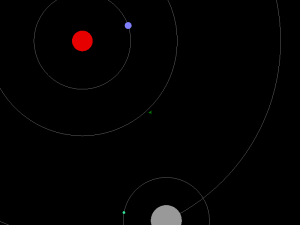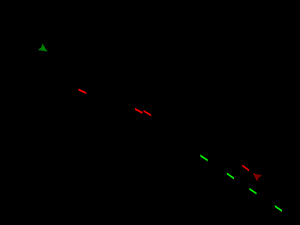Here’s the announcement of my latest programming project. It’s called Star Rover 2, and it’s a space flying game. You can fly around in space, trade goods, fight against other ships and complete missions for different governments. It features different difficulty levels, a high score list and several ways for the player to play the game. It’s also the first game I wrote in Haskell that’s actually playable.
The game itself is quite simple: you start on a planet, and you can buy some cargo if you want before launching into the space. In space, you can fly to other planets and see if you can sell your cargo for a better price. There are other ships in space as well, and you’ll get interrupted every once in a while when coming across one, with the possibility of attacking the other ship. If you win, you get their cargo, and the various governments may have their opinions about the attack as well.
As the game progresses, you may earn a reputation among the governing bodies, which leads to new dangers and possibilities. The international relationships are complicated, and attacking a ship of one nationality may not only affect the nationality being attacked but their friends and enemies as well. By playing your cards right you can receive missions from governors, and by completing them you may boost your ranking further.
The game is quite non-linear; it ends when your ship is destroyed often enough and you are too weak to continue, or when you choose to retire. At the end, your achievements are rated and you may make it to the high score list. Until then, you may choose your activities freely.
You can find Star Rover 2 at Hackage, so if you have cabal, you can install it by running cabal update && cabal install starrover2. You can also fetch the sources from github. As for dependencies, you’ll need SDL, OpenGL and FTGL.
In the beginning, Star Rover 2 was more or less a test of whether I can actually concentrate on one project enough to have a playable game in the end, and I’m glad it’s now reached a state where it can be released. Other than that, I was curious to see what programming such a game actually is like in Haskell, and I’m quite pleased with the results. I started working on Star Rover 2 on my spare time pretty much exactly a month ago, and now it amounts to about 2000 lines of Haskell code. I was a bit worried I couldn’t write a larger project in Haskell, but now I can see how well Haskell scales up to complex tasks. This was also my first project where monad transformers actually came in very handy.
Any feedback and bug reports are of course very welcome.


